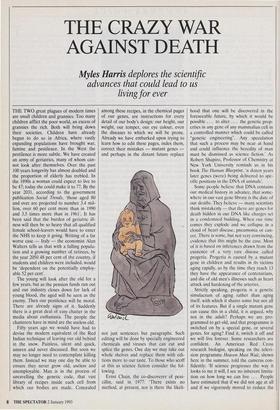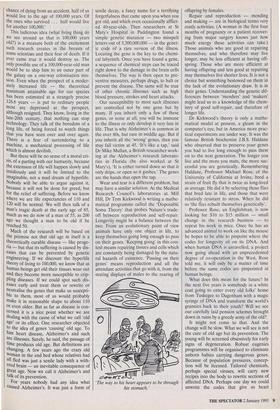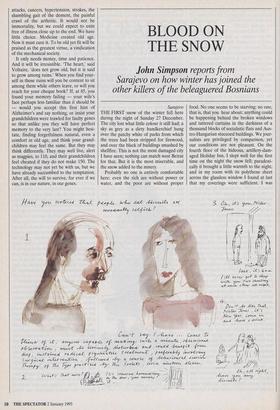THE CRAZY WAR AGAINST DEATH
Myles Harris deplores the scientific
advances that could lead to us living for ever
THE TWO great plagues of modern times are small children and grannies. Too many children afflict the poor world, an excess of grannies the rich. Both will bring down their societies. Children have already begun to do so in Africa, where vastly expanding populations have brought war, famine and pestilence. In the West the pestilence is more subtle. We have created an army of geriatrics, many of whom can- not look after themselves. Over the past 100 years longevity has almost doubled and the proportion of elderly has trebled. In the 1890s a woman could expect to live to be 47; today she could make it to 77. By the year 2031, according to the government publication Social Trends, 'those aged 80 and over are projected to number 3.4 mil- lion, over 60 per cent more than in 1990 and 3.5 times more than in 1961'. It has been said that the burden of geriatric ill- ness will then be so heavy that all qualified female school-leavers would have to enter the NHS to keep it going. Writing of a far worse case — Italy — the economist Alan Walters tells us that with a falling popula- tion and a growing number of retirees, by the year 2050 48 per cent of the country, if students and children were included, would be 'dependent on the potentially employ- able 52 per cent'.
The young will look after the old for a few years, but as the pension funds run out and our industry closes down for lack of young blood, the aged will be seen as the enemy. Then our pestilence will be moral. There are already signs of it. Suddenly there is a great deal of easy chatter in the media about euthanasia. The people the chatterers have in mind are the useless old.
Fifty years ago we would have had to devise the modern equivalent of the Red Indian technique of leaving our old behind in the snow. Painless, silent and quick, unseen and never discussed. But soon we may no longer need to contemplate killing them. Instead we may one day be able to ensure they never grow old, useless and unemployable. Man is in the process of unravelling the genetic code, that vast library of recipes inside each cell from which our bodies are made. Concealed among these recipes, in the chemical pages of our genes, are instructions for every detail of our body's design: our height, our weight, our temper, our eye colour, even the diseases to which we will be prone. Already we have embarked upon trying to learn how to edit these pages, index them, correct their mistakes — mutant genes — and perhaps in the distant future replace not just sentences but paragraphs. Such editing will be done by specially engineered chemicals and viruses that can cut and splice the genes. One day we may take out whole shelves and replace them with edi- tions more to our taste. To those who scoff at this as science fiction consider the fol- lowing.
Ernst Chain, the co-discoverer of peni- cillin, said in 1977: 'There exists no method, at present, nor is there the likeli-
hood that one will be discovered in the foreseeable future, by which it would be possible ... to alter ... the genetic prop- erties in any gene of any mammalian cell in a controlled manner which could be called "genetic engineering". Any speculation that such a process may be near at hand and could influence the heredity of man must be dismissed as science fiction.' As Robert Shapiro, Professor of Chemistry at New York University reminds us in his book The Human Blueprint, 'a dozen years later genes (were) being delivered to spe- cific positions in the DNA of animals'.
Some people believe that DNA contains our medical history in advance, that some- where in our vast gene library is the date of our deaths. They believe — many scientists think mistakenly — that there are genes for death hidden in our DNA like charges set in a condemned building. When our time comes they explode and we collapse in a cloud of heart disease, pneumonia or can- cer. There is some, but not very convincing, evidence that this might he the case. Most of it is based on inferences drawn from the existence of a very rare disease called progeria. Progeria is caused by a mutant gene in children and results in its victims aging rapidly, so by the time they reach 13 they have the appearance of centenarians, and die of old men's illnesses such as heart attack and hardening of the arteries.
Strictly speaking, progeria is a genetic simulacrum of aging rather than aging itself, with which it shares some but not all of its features. But if a single mutant gene can cause this in a child, it is argued, why not in the adult? Perhaps we are pro- grammed to get old, and that programme is switched on by a special gene, or several genes, for aging? Find it, switch it off and we will live forever. Some researchers are confident. An American • Red Cross research biologist, speaking on the televi- sion programme Heaven Must Wait, shown here in the summer, told the cameras con- fidently: 'If science progresses the way it looks to me it will, I see no inherent limita- tion on how long we can live ... People have estimated that if we did not age at all and if we vigorously moved to reduce the
chance of dying from an accident, half of us would live to the age of 100,000 years. Of the ones who survived . . . half would live for another I00,000.'
This ludicrous idea (what living thing do we see around us that is 100,000 years old?) is a measure both of the excitement such research creates in the breasts of some scientists and their fear of death. If it ever came true it would destroy us. The only possible use of a 100,000-year-old man would be to ship him to an outer part of the galaxy on a one-way colonisation mis- sion. Even when the prospect of a moder- ately increased life — the theoretical maximum attainable age for our species has been estimated at a strangely precise 126.6 years — is put to ordinary people most are depressed at the prospect, although resigned. They know, living in the late-20th century, that nothing can stop technology. They talk of the boredom of a long life, of being forced to watch things that you have seen over and over again. There is a fear of surrendering to a machine, a mechanical processing of life which is almost devilish.
But there will be no sense of a moral cri- sis, of a parting with our humanity, because the extension of life will happen slowly and insidiously and it will be limited to the imaginable, not a mad dream of hyperlife. Nobody will be able to argue against it, because it will not be done for greed, but for the relief of suffering. Before we know where we are life expectancies of 110 and 120 will be normal. We will then talk of a man's tragic death at the early age of 85, much as we do now of a man of 55, as 200 ago we thought a man to be old if he reached 50.
Much of the research will be based on the premise not that old age in itself is a theoretically curable disease — like proge- ria — but that its suffering is caused by dis- eases that can be prevented by genetic engineering. If we discount the hyperlife theory of living to 100,000, we know that as human beings get old their tissues wear out and they become more susceptible to crip- pling diseases. If we could spot such dis- eases early and treat them or rewrite or neutralise the genes that make us suscepti- ble to them, most of us would probably make it in reasonable shape to about 110 or even older. But as far as disease is con- cerned it is a nice point whether we are dealing with the cause of what we call 'old age' or its effect. One researcher objected to the idea of genes 'causing' old age. To him heart disease, Alzheimer's and such are illnesses. Surely, he said, the passage of time produces old age. But definitions are changing. A few years ago the crazy old Woman in the end bed whose relatives had all fled was just a senile lady with a with- ered brain — an inevitable consequence of great age. Now we call it Alzheimer's and talk of its prevention. For years nobody had any idea what caused Alzheimer's. It was just a form of senile decay, a fancy name for a terrifying forgetfulness that came upon you when you got old, and which even occasionally afflict- ed 40-year-olds. Then researchers at St Mary's Hospital in Paddington found a simple genetic mutation — two misspelt letters out of 3,300,000,000 — in the genet- ic code of a rare version of the illness. Locating the gene is the key to the chemi- cal labyrinth. Once you have found a gene, a sequence of chemical steps can be traced right down to the damage in the brain cells themselves. The way is then open to pre- ventive measures, perhaps drugs, to halt or prevent the disease. The same will be true of other chronic illnesses such as high blood pressure, strokes and heart attacks.
Our susceptibility to most such illnesses are controlled not by one gene but by many. If you inherit only a few of these genes, or none at all, you will be immune to the illness or only develop it very late in life. That is why Alzheimer's is common in the over 80s, but rare in middle age. But if you inherit all the 'wrong' genes, then you may fall victim at 45. 'It's like a tap,' said Dr Mike Mullan, a British researcher work- ing at the Alzheimer's research laborato- ries in Florida (he also worked at St Mary's). 'It is either turned down so that it only drips, or open so it gushes.' The genes are the hands that open the tap.
Wear and tear is a different problem, but may have a similar solution. At the Medical Research Council's laboratories at Mill Hill, Dr Tom Kirkwood is writing a mathe- matical programme called the 'Disposable Soma Theory' that probes Nature's trade- off between reproduction and self-repair. Longevity might be a balance between the two. From an evolutionary point of view animals have only one object in life, to keep themselves going long enough to pass on their genes. 'Keeping going' in this con- text means repairing tissues and cells which are constantly being damaged by the natu- ral hazards of existence. 'Passing on their genes' means reproduction and all the attendant activities that go with it, from the mating displays of males to the rearing of 'The way to his heart appears to be through his stomach.' offspring by females.
Repair and reproduction — mending and making — are in biological terms very costly activities. (A woman in the first four months of pregnancy or a patient recover- ing from major surgery knows just how much energy these activities can take.) Those animals who are good at repairing themselves, and who therefore may live longer, may be less efficient at having off- spring. Those who are more efficient at having offspring and less good at repairing may themselves live shorter lives. It is not a choice but something bestowed on them in the luck of the evolutionary draw. It is in their genes. Understanding the genetic dif- ferences between 'menders' and 'makers' might lead us to a knowledge of the chem- istry of good self-repair, and therefore of longer life.
Dr Kirkwood's theory is only a mathe- matical model at present, a gleam in the computer's eye, but in America more prac- tical experiments are under way. It was the famous British biochemist J.B.S. Haldane who observed that to preserve your genes you had to live long enough to pass them on to the next generation. The longer you live and the more you mate, the more suc- cessful you are genetically. Remembering Haldane, Professor Michael Rose, of the University of California at Irvine, bred a strain of fruit fly that is twice as long-lived as average. He did it by selecting those flies that bred late in life, and those that were relatively resistant to stress. When he did so 'the flies rebuilt themselves genetically'.
Professor Rose, an Englishman, is now looking for $10 to $15 million — small change in the research business — to repeat his work in mice. Once he has an advanced animal to work on like the mouse he hopes to be able to pinpoint where the codes for longevity sit on its DNA. And when human DNA is unravelled, a project now going ahead with an unprecedented degree of co-operation in the West, Rose told me, it will only be a matter of time before the same codes are pinpointed in human beings.
What does this mean for the future? In the next five years is somebody in a white coat going to enter every old folks' home from Tuskegee to Dagenham with a magic syringe of DNA and transform the world's grannies back to their youth? Will we see our carefully laid pension schemes brought down in ruins by a greedy army of the old?
It might not come to that. And the change will be slow. What we will see is not the cure of old age but its prevention. The young will be screened obsessively for early signs of degeneration. Robust eugenics programmes will be organised to eliminate unborn babies carrying dangerous genes. Because of population pressures, concep- tion will be licensed. Tailored chemicals, perhaps special viruses, will carry new recipes into the body to rewrite sections of affected DNA. Perhaps one day we could unwrite the codes that give us heart
attacks, cancers, hypertension, strokes, the shambling gait of the dement, the painful crawl of the arthritic. It would not be immortality, but we could expect to exist free of illness close up to the end. We have little choice. Medicine created old age. Now it must cure it. To be old yet fit will be praised as the greatest virtue, a vindication of the mechanical society.
It only needs money, time and patience. And it will be irresistible. 'The heart,' said Voltaire, 'does not grow old, but it is said to grow among ruins.' When you find your- self in those ruins will you be content to sit among them while others leave, or will you reach for your cheque book? If, at 85, you found your memory failing — your wife's face perhaps less familiar than it should be — would you accept this first hint of Alzheimer's and say nothing, or insist your grandchildren were trawled for faulty genes so that unlike you they will have perfect memory to the very last? You might hesi- tate, finding forgetfulness natural, even a comfort in old age, and think your grand- children may feel the same. But they may think differently. They may well live, alert as magpies, to 110, and their grandchildren feel cheated if they do not make 150. The technology may not yet be with us, but we have already succumbed to the temptation. After all, the will to survive, for ever if we can, is in our nature, in our genes.












































 Previous page
Previous page